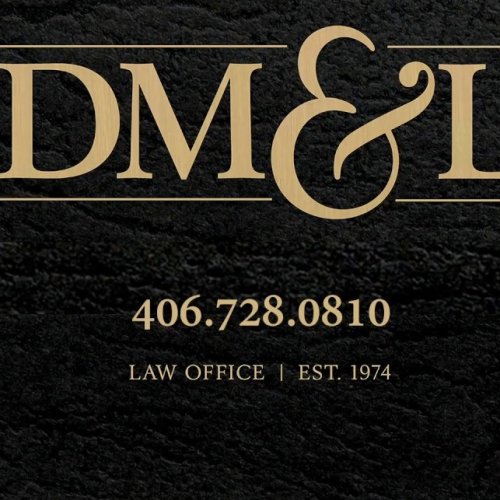Best Child Custody Lawyers in Montana
Share your needs with us, get contacted by law firms.
Free. Takes 2 min.
Free Guide to Hiring a Family Lawyer
Or refine your search by selecting a city:
List of the best lawyers in Montana, United States
About Child Custody Law in Montana, United States
Child custody law in Montana is focused on determining the best interests of a child when parents are separating, divorcing, or facing disputes about who should care for the child. In Montana, the courts refer to "parenting plans" rather than using terms like "custody" and "visitation." These plans outline each parent's rights and responsibilities regarding their children. The goal is always to provide a stable, loving, and supportive environment for the child or children involved, minimizing conflict and promoting healthy relationships with both parents whenever possible.
Why You May Need a Lawyer
Seeking legal advice or representation is crucial in several child custody situations, such as:
- You are going through a divorce and need to establish a parenting plan.
- One parent is relocating to another state or area, and you need to modify your current custody arrangement.
- There are concerns about the child's safety, such as allegations of abuse, neglect, or substance abuse.
- There are conflicts about child support, decision making, or disagreements about the interpretation of the existing parenting plan.
- One parent is not following the existing court order, and you need help with enforcement.
- You want to change an old parenting plan due to a significant change in circumstances.
A lawyer can help you understand your rights and ensure that your child's best interests are protected throughout the process.
Local Laws Overview
Montana’s child custody laws are governed primarily by the Montana Code Annotated, Title 40, Chapter 4. Here are some key aspects:
- The law prefers both parents to remain involved in the child's life, unless it is unsafe for the child.
- The term "parenting plan" is used instead of "custody" or "visitation." This plan sets the schedule, parental responsibilities, and how decisions are made.
- Courts make decisions based on the best interests of the child, considering factors such as the child's relationship with each parent, the child's wishes (if they are of sufficient age and maturity), mental and physical health, stability, and instances of domestic violence or substance abuse.
- Montana courts recognize joint and sole parenting plans, but joint plans do not always mean equal parenting time.
- Modifications to existing plans require a significant change in circumstances and must continue to reflect the child's best interests.
- Non-parents such as grandparents or stepparents may also request contact or visitation in certain circumstances.
- The state mandates mediation in many cases, unless there is evidence of domestic violence or other risks.
- Parental relocation is closely scrutinized, especially if it impacts the child's time with the other parent.
Frequently Asked Questions
What is a parenting plan in Montana?
A parenting plan is a court order outlining how parents will share responsibilities and time with their child. It covers living arrangements, schedules, decision making, and communication between the parents.
How do Montana courts decide on child custody issues?
Montana courts make decisions based on the best interests of the child, after considering factors like the parents’ relationship with the child, the child's needs, any history of violence or abuse, and each parent's ability to provide care.
Can a child choose which parent to live with in Montana?
The court may consider the child's preference if the child is old and mature enough, but it is not the deciding factor. The child's best interests always come first.
What is the difference between joint and sole parenting plans?
A joint parenting plan means both parents share decision making and time with the child, though not always equally. A sole parenting plan gives most or all decision making and care to one parent, usually for the child’s safety or well-being.
How can a parenting plan be changed?
If circumstances change significantly (such as a parent relocating, change in the child's needs, or safety concerns), you can request a modification from the court. You must show that the change is best for the child.
What if the other parent is not following the parenting plan?
If a parent repeatedly violates the plan, you can file a motion with the court to enforce the order. The court may impose sanctions, change the parenting plan, or take other actions to ensure compliance.
Do grandparents have visitation rights in Montana?
Grandparents may request visitation, but the court will grant it only if it is in the child’s best interest and will not interfere with the parent-child relationship.
How does child support relate to parenting plans?
Child support is determined separately from parenting time. A parent must pay support even if they have limited visitation, unless the court orders otherwise.
Can I move out of Montana with my child?
If your parenting plan or order addresses relocation, you must follow its requirements. Usually, you must provide notice to the other parent and possibly obtain court approval, especially if the move will significantly affect the current schedule.
Is mediation required for child custody disputes?
Montana courts often require mediation to help parents resolve disputes before a court hearing. However, mediation may be waived if there is domestic violence or other safety concerns.
Additional Resources
Several organizations and bodies can provide help and information:
- Montana Supreme Court Self-Help Law Centers - Provide forms, instructions, and guidance for self-represented individuals navigating family law cases.
- Montana Department of Public Health and Human Services - Offers support and resources regarding child welfare and family support services.
- State Bar of Montana Lawyer Referral Service - Assists in finding qualified family law attorneys.
- Montana Legal Services Association - Provides low-cost or free legal advice for eligible individuals.
- Local county court clerks - Provide access to relevant court forms and case information.
Next Steps
If you are facing a child custody or parenting plan issue in Montana, consider the following steps:
- Gather any court orders, documentation, and records related to your case.
- Write down your concerns, objectives, and questions in preparation for seeking legal advice.
- Decide if you want to try to resolve matters directly with the other parent, attend mediation, or seek legal counsel immediately.
- Contact a Montana family law attorney for a consultation to review your case and discuss your rights and options.
- Visit your local court’s self-help center for forms and procedural guidance if you choose to represent yourself.
- If you are unable to afford an attorney, reach out to Montana Legal Services Association or similar organizations for assistance.
- Always keep your child's best interests as your top priority throughout the process.
Taking the right steps early can help protect your rights and ensure the well-being of your child during a stressful and confusing time.
Lawzana helps you find the best lawyers and law firms in Montana through a curated and pre-screened list of qualified legal professionals. Our platform offers rankings and detailed profiles of attorneys and law firms, allowing you to compare based on practice areas, including Child Custody, experience, and client feedback.
Each profile includes a description of the firm's areas of practice, client reviews, team members and partners, year of establishment, spoken languages, office locations, contact information, social media presence, and any published articles or resources. Most firms on our platform speak English and are experienced in both local and international legal matters.
Get a quote from top-rated law firms in Montana, United States — quickly, securely, and without unnecessary hassle.
Disclaimer:
The information provided on this page is for general informational purposes only and does not constitute legal advice. While we strive to ensure the accuracy and relevance of the content, legal information may change over time, and interpretations of the law can vary. You should always consult with a qualified legal professional for advice specific to your situation.
We disclaim all liability for actions taken or not taken based on the content of this page. If you believe any information is incorrect or outdated, please contact us, and we will review and update it where appropriate.
Browse child custody law firms by city in Montana
Refine your search by selecting a city.










